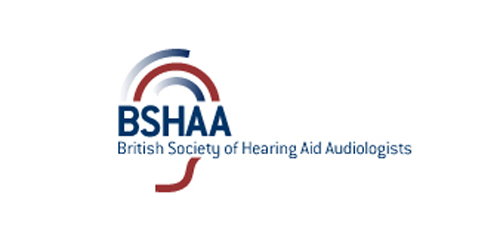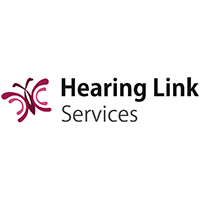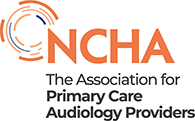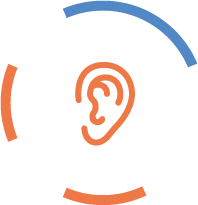We all depend on hearing and communication to survive and thrive. Reduced hearing can make it difficult to communicate with other people as well as to hear important sounds such as traffic.
The good news is that with the right support at the right time, people don't have to be disadvantaged by reduced hearing.
Taking action can help improve quality of life by keeping people connected with family, friends and society. Reducing the risks associated with unsupported hearing loss leads to improved general health and wellbeing.
In the sections below you can learn about hearing and hearing care in the UK.
- Hearing and communication
- Reduced hearing
- Tinnitus and earwax
- Taking action
- Hearing health professionals
- Accessing hearing services
- NHS hearing care
- Private hearing care
- Prevention
- Other support
Most of us take our hearing for granted, even though we rely on it to survive and thrive. Few of us have regular hearing checks, yet
- we rely on our hearing to stay connected with the world around us, for example, through spontaneous conversation, group discussion, watching the news and listening to music
- hearing is the sense we use to detect traffic, alarms and other signals that keep us safe and
- hearing is closely integrated with mental processes such as memory, attention and cognition.
Most of us will experience changes in our hearing from middle age. For example, children and teenagers with good hearing can often detect pitches of sound that are completely inaudible to adults over the age of 30.
Our hearing range continues to reduce with age, reaching a point where it starts squeezing out some of the sounds important for clear speech. If you are experiencing reduced hearing, you are not alone. In fact over 11 million people in the UK have reduced hearing, but most don't know that something can be done to lessen the impact it has on quality of life.
The scale and impact of reduced hearing makes hearing care as important and relevant to society as dental care and sight care.
Hearing care professionals help people get the best hearing and communication outcomes by
- helping people optimise their hearing throughout life by assessing, protecting and enhancing it and
- sharing advances in alternative means of communication for those unable to depend on hearing.
In the UK, people can choose to access hearing care through the NHS or privately.
It is possible to have very good hearing for some pitches of sound while having difficulty with others. This leads to the sensation that sounds lack clarity, like a jigsaw puzzle with pieces missing. The more pieces of sound there are missing, the harder it becomes to hear.
If our ability to hear is reduced, some or all of the sounds that other people can hear may become inaudible to us. Reduced hearing ability can make it difficult to follow conversations or detect important sounds in the environment.
For the majority of people the main difficulties that arise from reduced hearing are social. For example
- in all areas of life we generally expect others to hear and understand us. When we are unable to hear and cannot participate in conversations as expected, it can put us at a disadvantage socially, professionally and psychologically
- hearing connects us to each other. Qur reduction in hearing can impact on the people we communicate with, especially those closest to us.
This is why, if left unaddressed, reduced hearing can have a real impact on general health and wellbeing. For example, someone may begin by finding background noise difficult and start avoiding such situations, which might reduce their opportunities to socialise with family, friends and colleagues. This increases the risk of depression, social isolation and loneliness, which in turn may increase the risk of cognitive decline.
The good news is that with the right care at the right time, nobody has to be disadvantaged by reduced hearing. Taking action can help improve quality of life by keeping people connected to friends, family and society. This can also reduce the impact unsupported hearing loss has on general health and wellbeing of those with reduced hearing and those around them.
Tinnitus
Tinnitus is the perception of sound in the absence of sound from the environment.
It might be described as a 'ringing in the ears' - in fact tinnitus comes from the Latin word for 'ringing'. However not everybody with tinnitus experiences a ringing sensation. Some people, for example, might experience a buzzing, humming or grinding sound.
The impact of tinnitus varies from person to person. For some people it is not bothersome but for others it can have a severe impact on their quality of life.
Tinnitus is commonly associated with hearing loss although it is not commonly associated with other underlying physical problems, according to NICE guidelines.
Therefore, if you are experiencing tinnitus, you can contact your local hearing care provider for a hearing assessment, advice and support.
Read more about tinnitus on www.nhs.uk
Earwax
Earwax is a natural substance produced to lubricate and protect the ears.
If there is a build-up of earwax this can cause problems such as reduced hearing, the feeling of blocked ears, earache and tinnitus.
Many hearing care providers now provide earwax management services closer to home and in community settings out of hospital. If you want help with impacted earwax, you can contact your local hearing care provider.
Read more about earwax on www.nhs.uk.
Taking action
Benefits of taking action
Hearing checks can help identify the cause of reduced hearing and help achieve the best possible hearing and communication outcomes.
Hearing technology, such as hearing aids and other devices, can help restore the audibility of missing sounds by bringing back specific sounds into a person's hearing range. This helps maintain a person's ability to hear as expected and communicate effectively, which can improve their general wellbeing and quality of life.
For many people, appropriately prescribed and fitted hearing aids will be sufficient. For other individuals, changes to the environment or informing those around about how to improve communication may be required.
Similarly, if the environment or situation can be altered to reduce reliance on hearing, the impact of any reduction in hearing can be minimised. Examples include the use of captions/subtitles on TV, public announcements shown on a screen, making sure the speaker's face is visible; and the acoustic treatment of public places to reduce reverberation and background noise.
Each individual has different communication needs based on their lifestyle and the cause and level of reduced hearing. Hearing care professionals consider the impact of reduced hearing at an individual level and offer advice, support and/or technology to improve each person's quality of life.
Hearing care in the UK
Reduced hearing can be temporary or permanent. Having a hearing check can help identify the cause of reduced hearing and help achieve the best possible outcomes.
Most people experience a gradual reduction in hearing. This means most people will find it difficult to recognise whether they are missing particular sounds because changes occur over many years. This is why routine hearing checks are important.
In the UK adults can
- Access NHS funded ear and hearing care services or
- Self fund their ear and hearing care.
Occasionally someone may experience a sudden reduction in hearing, in which case it is important to see a qualified healthcare professional as soon as possible.
Some people are also born with reduced hearing. To learn more about newborn screening you can watch this NHS video.
It is important to always seek professional support if you have concerns about your hearing.
There are many professions that work in the field of hearing care. The table below provides an overview of various hearing specialists and doctors that work in the UK.
Hearing specialists - non-medical.
|
Name |
Overview |
|
Audiologist |
The name given to a wide range of non-medical health care professionals that specialise in hearing. This includes hearing aid dispensers, clinical scientists, hearing therapists, hearing and balance professionals. There is no statutory register for audiologists. Audiologists might choose voluntary registration with the Health and Care Professions Council (HCPC) or the Academy for Health Care Science. |
|
Hearing aid dispenser (HAD) |
The name given to hearing specialists regulated by the HCPC. This is a protected title and can only be used by professionals registered with the HCPC. They might also be referred to as an audiologist. |
|
Clinical scientist |
Some audiologists who work in specialist areas, for example cochlear implants or balance rehabilitation or assessment, are registered as clinical scientists with the HCPC. |
|
ENT nurse |
Some nurses specialise in ENT. They work in a wide range of settings, including community practices (on the high street), GP surgeries and hospitals. They often manage earwax but may also offer a wider range of treatments and support. Nurses are regulated by the Nursing and Midwifery Council. |
Hearing specialists - medical
|
Name |
Overview |
|
Audiovestibular Physician |
Medical doctors. Audiovestibular medicine is a medical speciality concerned with the diagnosis and management of hearing and balance disorders in adults and children. |
|
ENT doctor and otologist |
Medical doctors. They diagnose and treat diseases of the ear, as well as perform surgery. |
|
Pediatrician |
Medical doctors. Some paediatricians have a special interest in hearing. |
In the UK people have a choice about whether they access hearing care through the NHS or privately
- in most regions, people that choose to access hearing care on the NHS currently have to see their GP for a referral to a Hearing Care Professional
- people can choose to access hearing care privately in the same way that they access sight and dental care. People that choose private hearing care do not have to wait until they have a problem to have a hearing check.
NHS Hearing Care
In some parts of the UK people have a choice of provider and can choose to access their hearing care closer to home. In other parts of the UK people still have to travel to a hospital to access routine NHS hearing care. The table below provides information for each country.

The official website of the NHS in England. It explains hearing and ear conditions, and can help you find NHS hearing care near you.
In many parts of England people can now access NHS hearing care out of hospital.
Find a NHS Hearing service near you
Read more about hearing loss

The official website for government services in Northern Ireland. It explains hearing and ear conditions and how you can access NHS hearing care in Northern Ireland.

NHSScotland's official health information. It explains hearing and ear conditions and how you can access NHS hearing care in Scotland.
nhsinform.co.uk or over the phone on 0800 22 44 88 (8am-10pm).

NHS 111 Wales is a health advice and information service. It explains hearing and ear conditions and how you can access NHS hearing care in Wales.
Private hearing care
If people want to access ear and hearing care privately they do not need a referral from their GP. Just like visiting an optician or dentist, people can choose to visit a regulated Hearing Aid Dispenser (HAD). If the HAD feels a medical opinion is required they will refer to a medically qualified colleague. The table below provides links to more information about self-funded ear and hearing care in the UK.

The Health Care and Professions Council regulates hearing aid dispensers. You can check your dispenser is registered here.

Which? Is the largest consumer body in the UK. It offers advice on obtaining hearing aids.

The Association of Independent Hearing Healthcare Professionals is a professional association. You can find your nearest AIHHIP member here.

The British Society of Hearing Aid Audiologists is a professional body which represents hearing aid professionals. You can find a local BSHAA member here.
Prevention
Reduced hearing might be caused by one or more risk factors
- some risk factors can be controlled or eliminated. For example, wearing appropriate ear protection and avoiding excessive noises can help reduce noise-induced hearing loss.
- other risk factors such as age are not modifiable
See a list of risk factors for hearing loss.
The HSE and hseni offer advice and guidance on preventing hearing loss at work. The NHS also offers tips on preventing hearing loss.

The national independent watchdog for work-related health, safety and illness. It acts in the public interest to reduce work-related injury across Great Britain's workplaces.It has a section dedicated to noise-induced hearing loss on its website.

The Health and Safety Executive for Northern Ireland is the lead body responsible for the promotion and enforcement of health and safety at work standards in Northern Ireland. It has a section on noise-induced hearing loss on its website.
Other Support

Provides information and support for people with hearing loss and tinnitus. Learn more here.

Helps people to find information and support and to connect with others who have similar experiences. Learn more here.

Support for children and adults who are deafblind or have sensory impairments. Learn more here.

Focused on helping children and young people with hearing loss. Learn more here.

Information and support for people, who have lost all or most of their useful hearing, to help enable them to regain their independence and enjoy the best quality of life. Learn more here.

Helps and supports the public, professionals and organisations to achieve better tinnitus awareness. Learn more here.

 Your hearing and aural health
Your hearing and aural health  Commissioners and Policymakers
Commissioners and Policymakers  Member support and guidance
Member support and guidance News and views
News and views
 Hearing map
Hearing map
